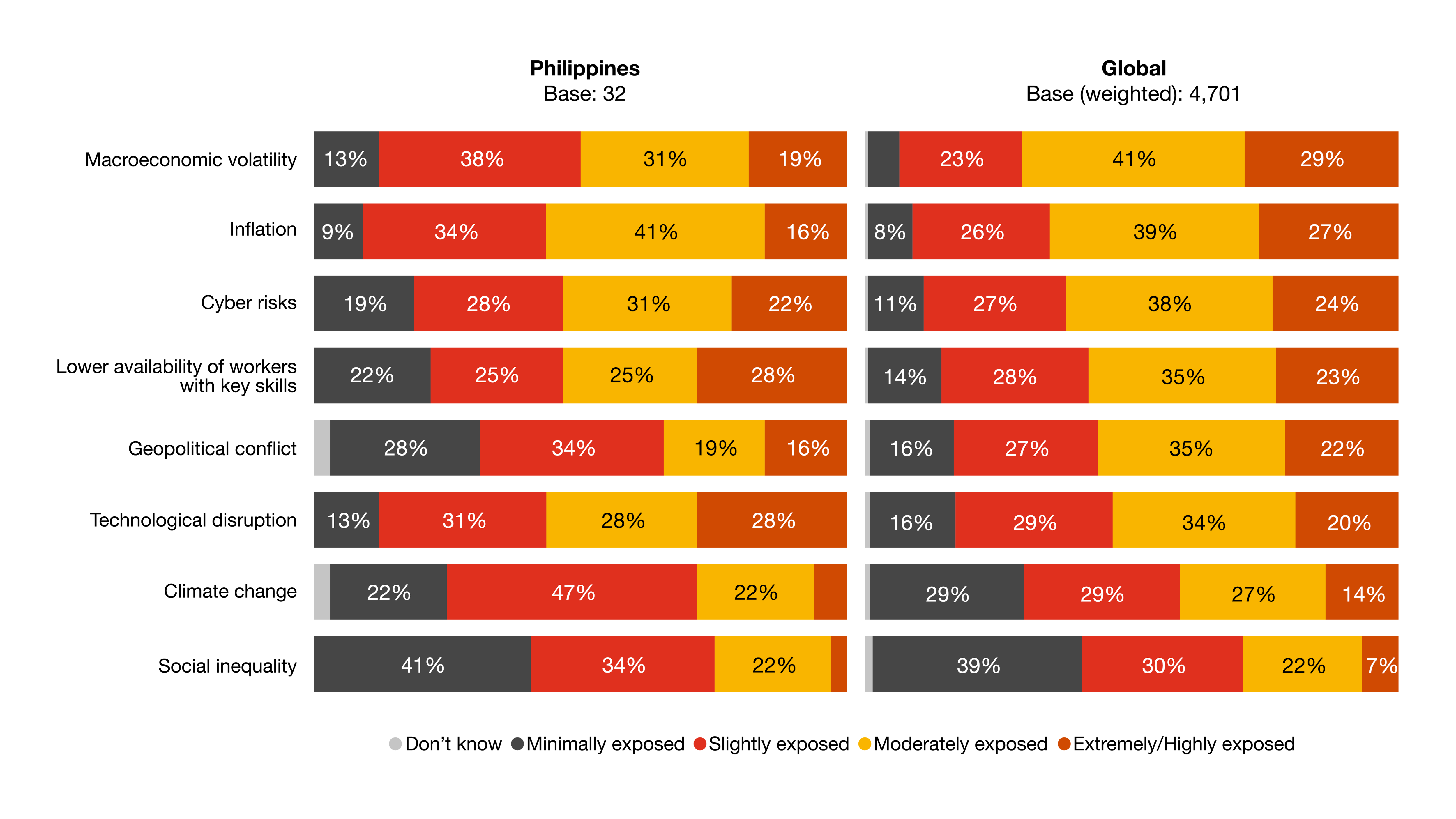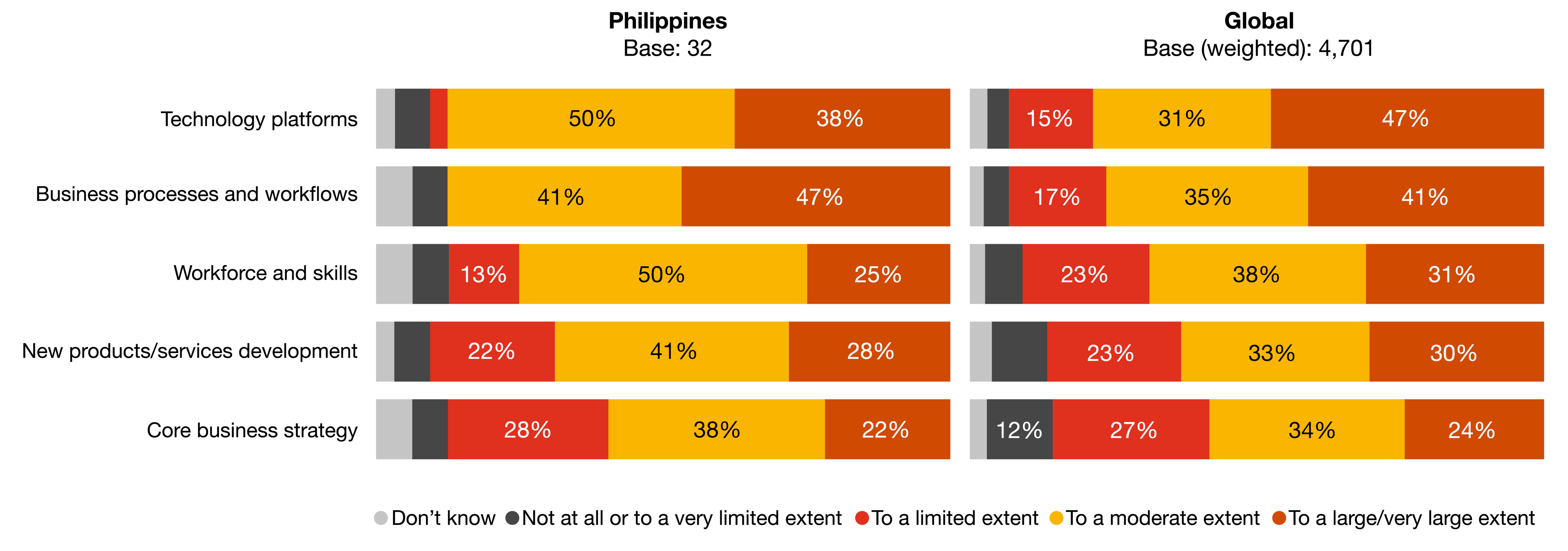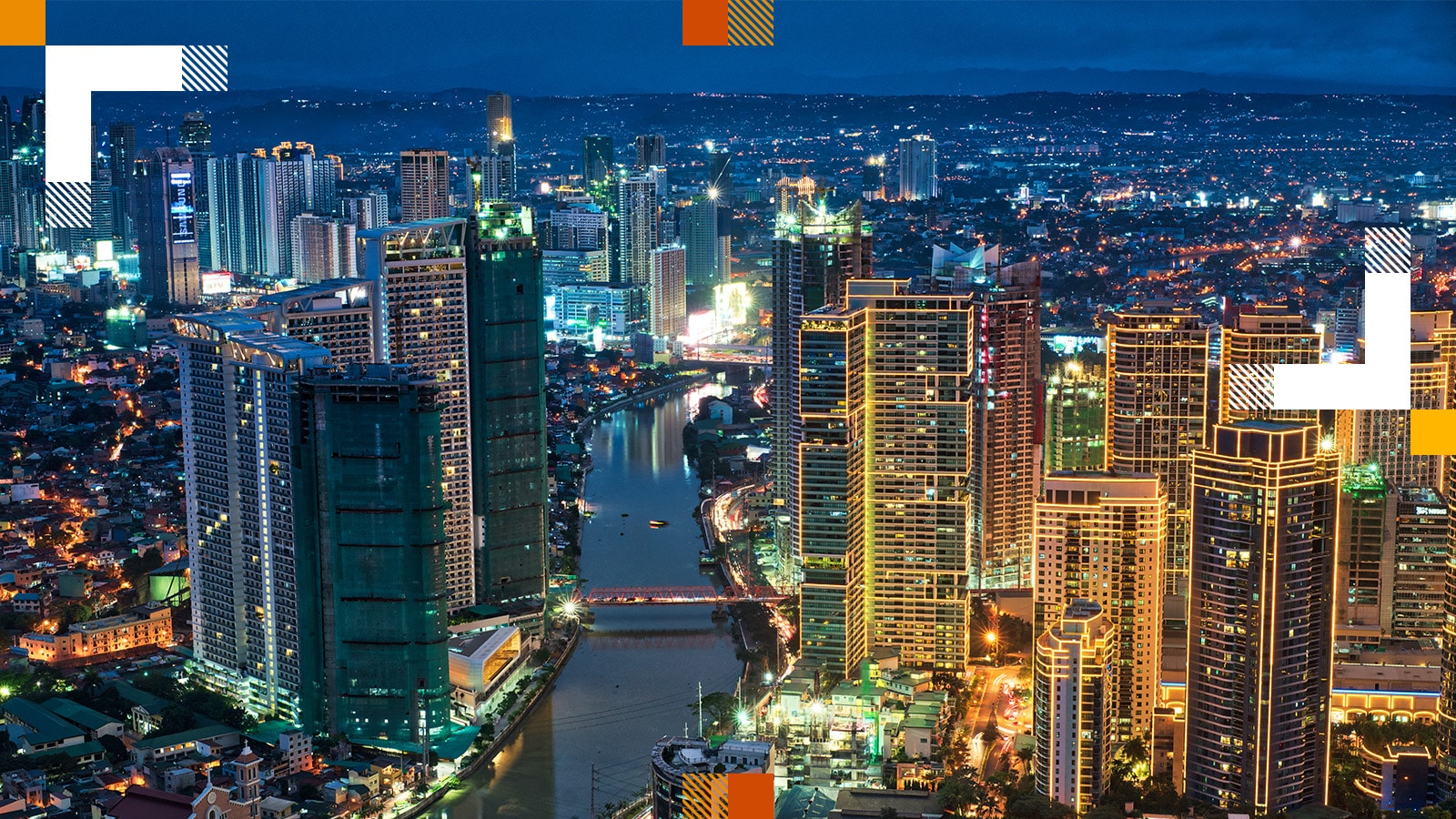The global business landscape is undergoing a major transformation shaped by two powerful forces: artificial intelligence (AI) and climate change. In the Philippines, CEOs maintain a positive outlook on economic growth but recognize the dual imperatives: they must speed up their adoption of new technologies and increase their focus on sustainability.
This report explores key findings from the Philippine cut of PwC’s 28th Annual Global CEO Survey, offering a closer look at how CEOs in the Philippines are navigating macroeconomic trends, business reinvention and AI adoption to stay competitive in a rapidly evolving global economy.
Chapter 1 Two defining issues: AI and climate change
AI and climate change are reshaping industries worldwide, and Filipino CEOs are stepping up to address these challenges head-on.
Generative AI adoption
While global CEOs show substantial trust in AI technology, Philippine-based business leaders demonstrate higher confidence levels. This enhanced trust in AI's transformative potential is evident in their strategic planning: Many Filipino CEOs are actively preparing to integrate AI across their organizations, from business processes and workflows to technology platforms and workforce skills—signaling a proactive approach to leveraging technology for efficiency and growth.
Globally, AI adoption has already delivered significant benefits, with over half of CEOs citing efficiency gains and about a third reporting increased revenue and profitability. In the Philippines, this optimism is fueling innovation and driving momentum for further AI integration.
Sustainability investments
Beyond technological advancement, Philippine CEOs are also focusing on environmental concerns. Climate change has emerged as an immediate and critical business priority. Forward-thinking companies are transforming environmental challenges into strategic opportunities through climate-friendly initiatives. The data is compelling: Organizations that embrace sustainability are demonstrating remarkable success, with sustainable businesses six times more likely to achieve revenue growth.
However, sustainability efforts face significant challenges in the Philippines. The survey shows that more than half of Philippine CEOs have not made any climate-friendly investments in the past year, highlighting a gap between awareness and action. While some global CEOs, particularly in countries like China, benefit from government incentives and increased revenues from sustainable practices, Philippine businesses are still in the early stages of their sustainability journey.
As these two defining issues converge, Filipino CEOs have an opportunity to leverage technologies like AI not only to transform their business models but also to accelerate their adoption of sustainable practices, though significant investment and policy support may be needed to close the current implementation gap.
Chapter 2 Business as (un)usual
"Business as usual" is no longer enough for Philippine-based CEOs today. Rapid technological advancements, shifting economic realities and the growing importance of sustainability require companies to reimagine how they operate.
Viability expectation
The urgency of transformation is evident: 69% of Filipino CEOs believe their businesses will remain economically viable for only ten years or less if they continue on their current path. This stark assessment reflects growing concerns about rapid technological changes, evolving consumer preferences and increasing competitive pressures. Without significant changes to their business models, operational processes and technological capabilities, organizations risk becoming obsolete in an increasingly dynamic market environment. To keep up, CEOs must focus on fundamental transformation rather than incremental improvements.
If your company continues running on its current path, for how long do you think your business will be economically viable?
Please select one response.
Source: PwC's 28th Annual Global CEO Survey
Economic and revenue growth outlook
Despite the need for fundamental transformation, Philippine-based CEOs maintain strong optimism about economic prospects. Over half express confidence in global economic growth, while 78% are optimistic about domestic economic expansion—significantly higher than the global average. Their confidence in revenue growth varies by timeframe—they are cautiously positive about the next 12 months, but strongly optimistic about growth over the next three years. This outlook reflects their readiness to handle both immediate economic challenges and long-term market changes.
How do you believe economic growth (i.e., gross domestic product) will change, if at all, over the next 12 months in the global economy/your territory?
Please select one response for each statement.
Source: PwC's 28th Annual Global CEO Survey
How confident are you about your company's prospects for revenue growth over the next 12 months/3 years?
Please select one response for each statement.
Source: PwC's 28th Annual Global CEO Survey
Headcount expansion plans
Filipino CEOs are also doubling down on growth, with 59% planning to increase their headcount in the next 12 months—exceeding the global average of 42%. This commitment to human capital signals a long-term vision of strengthening capabilities to support business strategies.
To what extent will your company increase or decrease headcount in the next 12 months?
Please select one response.
Source: PwC's 28th Annual Global CEO Survey
Skills gap
In addition to macroeconomic volatility and inflation, Filipino CEOs are also concerned about technological disruption, particularly keeping pace with rapid digital changes, and a significant shortage of workers with critical skills needed for modern business operations.
This skills gap is especially pronounced in areas like data analytics, digital transformation and emerging technologies. These challenges underscore the urgent need for targeted investments in two key areas: comprehensive workforce development programs to upskill existing employees and attract new talent, and accelerated digital transformation initiatives to ensure organizations remain competitive in an increasingly tech-driven business landscape.
How exposed* do you believe your company will be to the following key threats in the next 12 months?
Please select one response for each threat.
*Exposure is defined as the probability of significant financial loss.

Source: PwC's 28th Annual Global CEO Survey
Reactive decision-making
Philippine-based CEOs also differ from their global counterparts in their approach to transformation. While global leaders tend to favor deliberate and structured planning, Filipino CEOs describe their organizations as a mix of intentional strategies and reactive, unplanned developments. This reactive management style demonstrates both strengths and challenges for Filipino business leaders. While it shows impressive adaptability and a quick response to market changes, it also reveals a key weakness: insufficient long-term strategic planning. To succeed, Philippine organizations must balance their natural adaptability with more structured, forward-looking approaches.
Chapter 3 Continual reinvention
In this era of unprecedented change, Philippine-based CEOs recognize that strategic transformation is vital for long-term viability.
AI trust and adoption
Confident in AI's potential, many Philippine-based CEOs plan to integrate it throughout their organizations over the next three years. Their plans include modernizing technology platforms with AI-ready infrastructure, transforming business processes, developing workforce capabilities, creating AI-enhanced products and services, and aligning these initiatives with long-term business objectives.
To what extent, if at all, do you predict AI (including generative AI*) will be systematically integrated into the following areas in your company in the next three years?
Please select one response for each area.
*Generative AI is a type of artificial intelligence that can create, enhance, summarise and analyse unstructured data such as text, code and images.

Source: PwC's 28th Annual Global CEO Survey
Acquisitions: past and future
Few Philippine-based CEOs have pursued major acquisitions in the past three years, and even fewer plan significant acquisitions in the near future, which aligns with global averages. This approach indicates a preference for organic growth and internal innovation as primary strategies for business development.
Has your company made a major acquisition (more than 10% of assets) in the last three years?
Please select one response.
Source: PwC's 28th Annual Global CEO Survey
How many acquisitions is your company planning to make in the next three years?
Please select one response.
Source: PwC's 28th Annual Global CEO Survey
CEO tenure and time horizon
Also similar with global trends, approximately one-third of Filipino CEOs anticipate maintaining their leadership positions for the next three to five years. This length of tenure provides a crucial window for implementing comprehensive organizational changes while maintaining operational continuity. Such stability in leadership proves particularly valuable as these executives navigate complex transformations, allowing them to build strong foundations for innovation while carefully balancing immediate operational needs with strategic long-term objectives.
Conclusion
The future of business in the Philippines hinges on how CEOs address the intertwined forces of AI and climate change. Leaders who proactively embed AI into their organizations and align their strategies with sustainability goals will be best positioned to thrive in an increasingly complex global economy.
The survey underscores an urgent need for action: Are CEOs adopting AI quickly enough? Are they embracing sustainability? And can they adapt their operations fast enough to stay competitive?
For Philippine-based CEOs, the time to act is now. The challenges are significant, but so are the opportunities. Success will depend on balancing immediate innovation with long-term goals, ensuring their businesses not only survive but thrive in a rapidly changing world.
Note: Throughout this snapshot, not all figures will add up to 100% as a result of rounding percentages and the decision in certain cases to exclude the display of ‘neither/nor’, ‘other’, ‘none of the above’, ‘don’t know’ and ‘prefer not to say’ responses.





